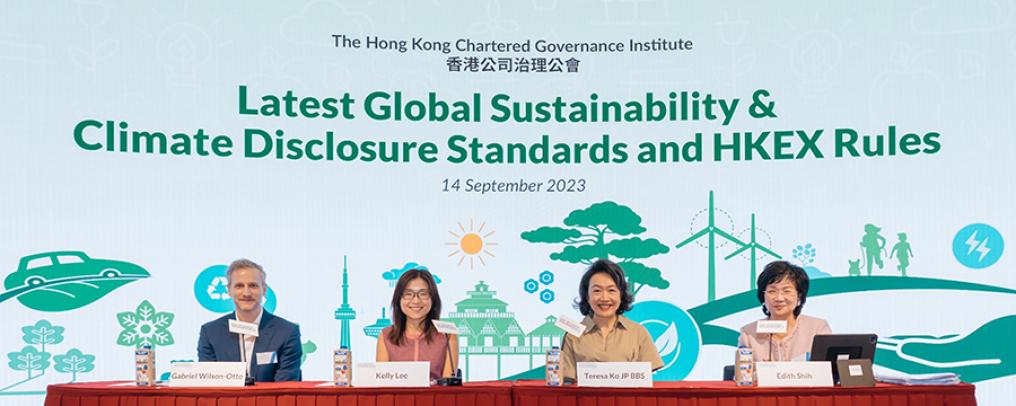CGj highlights the latest guidance notes added to the Thought Leadership section of the Institute’s website.
Highlights
- forthcoming amendments to the Securities and Futures Ordinance will empower the SFC to address instances of cross-border insider dealing
- resale price maintenance (RPM) agreements are a relatively new focus for the enforcement and educational work of the Hong Kong Competition Commission
- determining the legality of RPM arrangements may not be a clear-cut exercise and relevant parties should seek legal advice
The Institute regularly publishes guidance notes keeping practitioners up to date on all the latest developments in governance, risk and compliance. This area of its work has accelerated since it formed seven Interest Groups under its Technical Consultation Panel in 2016. This article highlights the two latest guidance notes to be published as part of the Interest Groups guidance note series.
Cross-border insider dealing
In June 2022, the Securities and Futures Commission (SFC) consulted the market on proposals to broaden the insider dealing provisions of the Securities and Futures Ordinance (SFO). On 8 August 2023, the consultation conclusions confirmed that the proposed SFO amendments will go ahead to empower the SFC to address instances of cross-border insider dealing. The latest guidance note published in September this year by the Institute’s Securities Law and Regulation Interest Group – SFC’s Initiatives to Address Cross-Border Insider Dealing – explains the background and the implications of these developments.
What are the proposed amendments to the SFO?
The guidance note starts by setting out the background to the SFC’s proposed reforms. The SFO currently covers insider dealing in:
- Hong Kong–listed securities and their derivatives, and
- securities dual-listed in Hong Kong and another jurisdiction, along with their derivatives.
The law does not explicitly encompass instances of insider dealing occurring outside Hong Kong but involving Hong Kong–listed securities or their derivatives. The forthcoming amendments to the SFO will expand the insider dealing regime to encompass:
- insider dealing occurring in Hong Kong involving overseas-listed securities or their derivatives, and
- insider dealing occurring outside Hong Kong involving any Hong Kong–listed securities or their derivatives.
The Institute’s consultation submission
The Institute’s consultation submission on this issue suggested that there is a need for more clarity on the scope of the proposed SFO amendments. For example, would insider dealing be determined by reference to Hong Kong law or the law of the relevant overseas jurisdiction and what standards of proof would be applied when determining criminal liability?
‘From the governance perspective, we recommend more guidance and investor education if a change is made to the SFO’s reach beyond Hong Kong,’ the submission states.
The SFC addressed requests for clarification by the Institute and other respondents in its consultation conclusions. For example, it made it clear that the revised provisions will specify that the misconduct must also be unlawful in the relevant overseas jurisdiction, and the present definition of ‘derivatives’ and the applicability of the insider dealing framework to over-the-counter transactions in listed debt securities will remain unchanged. The expanded insider dealing framework will encompass such transactions involving both Hong Kong–listed and overseas-listed debt securities unless one of the statutory defences applies.
‘In essence, it’s the territorial scope that is being changed,’ the guidance note points out. It adds, however, that no transition period will be provided upon the implementation of the revised insider dealing provisions. Moreover, governance professionals working for licensed firms should be mindful that the requirement to report breaches under the Code of Conduct for Persons Licensed by or Registered with the SFC will apply to the updated insider dealing provisions, including insider dealing of overseas-listed securities.
‘They are required to submit a report upon becoming aware of any suspected breaches. In relation to concerns over cross-border data transfer restrictions, the SFC responded that firms should use their best endeavours to obtain any data that is located overseas (for example, where there is suspected insider dealing in overseas-listed securities) to submit in their report to the SFC,’ the guidance notes explains.
Professional investor exemptions
The guidance note also discusses some of the consultation proposals that have been put on hold. This includes the proposal to narrow the professional investor (PI) exemptions in the SFO. Despite the failure to proceed with this proposal, the SFC warns that anyone seeking to invoke a PI exemption under the SFO must be able to demonstrate a clear intention to distribute the investment product exclusively to PIs.
The SFC considers that the clear display of an appropriate message or warning on all advertising materials would significantly contribute to establishing this intent. A recent case before the Court of Final Appeal, however, concurred with the appellants’ argument that the SFO does not require that it be made apparent on the advertisement itself that it is made in respect of PIs. It only requires a person invoking the exemption to demonstrate that the relevant investment is in fact intended solely for PIs.
Nevertheless, the Securities Law and Regulation Interest Group guidance note recommends issuers of advertisements to carefully consider how best to demonstrate and evidence a genuine intention to distribute an investment product only to PIs, especially in light of the SFC’s stance on this issue.
The SFC is contemplating providing additional guidance to the market on this subject.
Competition compliance
The latest guidance note published by the Institute’s Competition Law Interest Group in August this year addresses a relatively new focus for the enforcement and educational work of the Hong Kong Competition Commission (Commission) – resale price maintenance (RPM).
RPM occurs when suppliers or distributors impose restrictions on the resale prices of products. This might involve suppliers directly setting a fixed or minimum price for resale, or indirectly fixing the distributors’ margin or the maximum level of discount the distributor can grant from a set price level. In some cases, a distributor may pressure its supplier to implement RPM in order to limit price competition at the distributor level.
The latest guidance note issued by the Competition Law Interest Group – Guidance Note on Resale Price Maintenance – points out that, by limiting the ability of distributors to compete with each other on price, RPM arrangements may result in harm to competition and ultimately consumers. Such arrangements may therefore contravene the Competition Ordinance.
The Commission has stepped up its fight against RPM with an enforcement proceeding launched in September 2022 and a city-wide advertising campaign to broaden awareness of the compliance risks involved. The guidance note highlights what a new educational RPM brochure, launched by the Commission in June 2023, tells us about the Commission’s objectives and likely enforcement approach in this area of competition compliance.
“anyone seeking to invoke a professional investor exemption under the SFO must be able to demonstrate a clear intention to distribute the investment product exclusively to professional investors”
Is the Commission taking a new approach to RPM?
Determining whether RPM agreements breach the Competition Ordinance is not as simple as the above definition might imply. It remains generally lawful for suppliers to recommend resale prices and to set maximum resale prices, for example. The brochure is careful not to suggest that all cases of RPM will contravene the Competition Ordinance, but it emphasises the potential harm to competition that may arise from fixed or minimum resale prices.
The guidance note finds that the Commission’s principles for analysing RPM in the RPM brochure generally remain the same as those identified in the Commission’s Guideline on the First Conduct Rule published in 2015. The Commission remains committed to analysing whether the RPM arrangement has the ‘object’ or ‘effect’ of harming competition and whether the ‘economic efficiency’ exclusions apply.
The brochure mentions two examples of possible economic efficiencies, namely where:
- RPM is set for a short period of time to introduce a new product, and
- RPM is used to prevent discount resellers from free-riding the benefit of investments made by other resellers.
Nevertheless, the brochure includes a reminder that all four limbs of the statutory economic efficiency exclusion must be satisfied if economic efficiencies are to be claimed. These are as follows:
- the agreement contributes to improving production or distribution, or promoting technical or economic progress
- consumers receive a fair share of the efficiencies
- the agreement does not impose on the undertakings concerned restrictions that are not indispensable to the attainment of the relevant efficiencies, and
- the agreement does not allow the undertakings the possibility of eliminating competition in respect of a substantial part of the goods or services in question.
The guidance note also warns that, as the Commission’s position is that RPM can be a form of ‘serious anti-competitive conduct’, it can take enforcement action against unlawful RPM in the same manner as cartel cases. That is, small and medium businesses may not benefit from the statutory ‘agreements of lesser significance’ exclusion, and enforcement proceedings in the Tribunal can be lodged without a prior Warning Notice.
If in doubt, seek legal advice
The Commission’s RPM brochure reaffirms its commitment to investigate all kinds of anti-competitive behaviour. ‘While cartel enforcement will likely continue to be an enforcement priority of the Commission, this latest RPM campaign by the Commission may result in more RPM complaints, which could lead to more investigations and enforcement cases on RPM in the future,’ the guidance note warns.
In this context, the brochure will no doubt be useful to suppliers and distributors wishing to avoid engaging in anti-competitive RPM. Particularly useful, the guidance note points out, will be the ‘practical tips’ section. While these tips are not comprehensive, they should help parties identify higher-risk scenarios.
The guidance note emphasises, however, that the RPM brochure falls short of providing legal certainty on the issue of RPM. Determining the legality of RPM arrangements may not be a clear-cut exercise and may require complex economic analysis of factors beyond those mentioned in the RPM brochure. It therefore recommends that Hong Kong businesses contemplating getting involved in vertical price restraints, whether fixed or minimum resale prices, or recommended or maximum resale prices, should seek legal advice.
The guidance notes reviewed in this article are available in the Thought Leadership section of the Institute’s website: www.hkcgi.org.hk. Readers can find a review of the latest guidance notes produced by Institute’s Technology Interest Group in the September 2023 edition of CGj. The guidance notes on the use of virtual meeting technologies published by the Institute’s Company Law Interest Group were reviewed in the May edition of this journal.
SIDEBAR: Credits
The Institute would like to thank all those involved in the publication of the guidance notes reviewed in this article. Hannah Cassidy, Partner, Head of Financial Services Regulatory, Asia, Herbert Smith Freehills, was author of the Securities Law and Regulation Interest Group guidance note. The members of this Interest Group are: Daniel Wan FCG HKFCG (Chairman), Agnes Wong, Bill Wang FCG HKFCG, CK Low FCG HKFCG, CK Poon FCG HKFCG(PE), Dr David Ng FCG HKFCG and Tommy Tong FCG HKFCG.
Natalie Yeung, Partner, Slaughter and May, was the author of the Competition Law Interest Group guidance note. She was assisted by Alexander Lee, Counsel, and Adam Janmohamed, Registered Foreign Lawyer, Slaughter and May. The members of this Interest Group are David Simmonds FCG HKFCG (Chairman), Adelaide Luke, Alastair Mordaunt, Brian Kennelly KC, Mike Thomas and Natalie Yeung.
April Chan FCG HKFCG, Institute Past President, is Chairman of the Institute’s Technical Consultation Panel with oversight of the Institute’s Interest Groups. Mohan Datwani FCG HKFCG(PE), Institute Deputy Chief Executive, serves as Secretary to the Institute’s Interest Groups.
If you have any comments and/or suggestions relating to the Institute’s thought leadership, please contact: mohan.datwani@hkcgi.org.hk.
“the [Competition] Commission has stepped up its fight against resale price maintenance with an enforcement proceeding launched in September 2022 and a city-wide advertising campaign to broaden awareness of the compliance risks involved”



